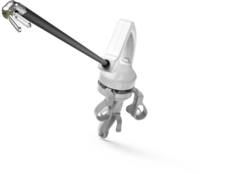A research team from Seoul National University Bundang Hospital (SNUBH), led by Professors Oh Heung-kwon and Shin Hye-rim from the Department of Surgery, has demonstrated that articulated instruments can improve depth perception and operational efficiency in laparoscopic colorectal surgery compared to conventional fixed instruments.
The findings, published in the October issue of Colorectal Disease, suggest the tools can reduce operation times and enhance surgical outcomes.

Laparoscopic colorectal surgery requires precise maneuvers in confined spaces. Conventional fixed instruments, which move in a single direction, have been criticized for limiting the surgeon’s field of view and precision. Articulated instruments, designed with multi-jointed mechanisms that mimic wrist movements, offer greater flexibility and improved control in tight surgical areas, an SNUBH official said.
The hospital's study involved 70 patients undergoing laparoscopic colorectal surgery. Twenty were treated with fixed instruments, while 50 underwent procedures with articulated tools.
Researchers assessed outcomes using video analysis and the modified Global Operative Assessment of Laparoscopic Skills (mGOALS), which evaluates depth perception, dexterity, efficiency, and tissue handling. The study also compared performance in the "experienced phase" by analyzing the learning curve to assess proficiency with accumulated use. Additional metrics included operation time, blood loss, hospital stay, and postoperative complications.

Results showed that articulated instruments reduced operation times by 34 minutes and halved intraoperative blood loss. The tools also improved surgeons’ ability to handle tissues and perceive depth, enhancing overall surgical precision and efficiency.
The study further revealed that surgeons adapted quickly to the new instruments, achieving proficiency after approximately 10 uses. “This study is the first to verify the efficacy and safety of articulated laparoscopic instruments in colorectal surgery,” said the SNUBH official. “It highlights their potential to improve surgical efficiency and support faster patient recovery.”
Professor Oh noted that “articulated instruments offer capabilities similar to robotic systems at a lower cost, making them a practical choice for broader medical applications.” He added that further research is planned to validate their use in other complex procedures and strengthen clinical evidence.
Related articles
- [Interview] 'Goryeo saram' doctor in Korea advances global patient care at SNUBH International Healthcare Center
- Researchers predict contralateral moyamoya disease progression after single-sided brain surgery
- The greater the grit, the better the sleep: study
- SNUBH Professor Kim elected chair of infectious disease society
- SNUBH study reveals gender-specific genetic factors of autism among Koreans
- SNUBH unveils new vision on 21st anniversary, pledging to advance healthcare and build trust
- SNUBH lymphedema clinic 1st in Korea to receive Center of Excellence in surgery from LE&RN
- Study finds interconnected role of abdominal obesity, visceral fat in driving metabolic syndrome, chronic disease risks

